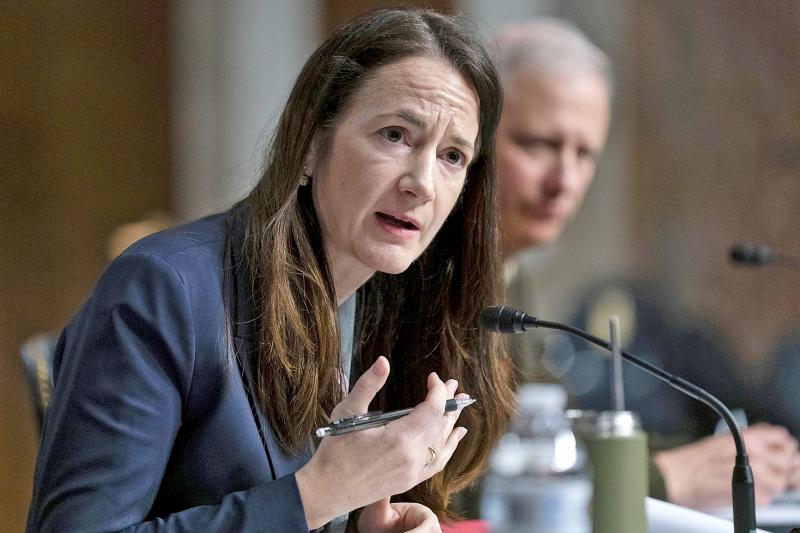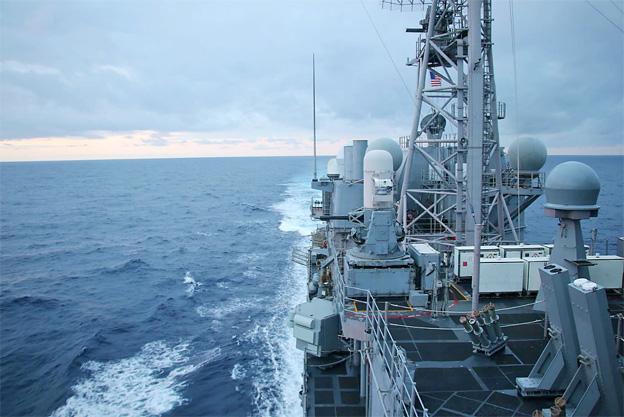The threat posed by China to Taiwan until 2030 is “critical,” US Director of National Intelligence Avril Haines said on Tuesday while testifying on worldwide threats at a hearing of the US Senate Committee on Armed Services.
“I think it’s fair to say that it’s critical, or acute,” Haines said when asked by US Senator Josh Hawley if she viewed the threat facing Taiwan to be acute from now until 2030.
“It’s our view that they [China] are working hard to effectively put themselves into a position in which their military is capable of taking Taiwan over our intervention,” she said, without elaborating.

Photo: AP
Beijing is closely watching the Russian invasion of Ukraine, which started more than two months ago, but it is unclear what lessons China might have learned since then, she said.
Whatever those lessons might be could affect China’s plan regarding Taiwan, but Russia’s invasion had not accelerated Beijing’s timeline, Haines said, citing US intelligence assessments.
US Defense Intelligence Agency Director Scott Berrier said he was “not seeing anything that would tell me that they’re [China] thinking about trying to take advantage of this time.”

Photo courtesy of US 7th Fleet
“We’re not really sure what lessons [Chinese President] Xi Jinping (習近平) is taking away from this conflict right now,” Berrier said. “We would hope that they would be the right ones.”
Hopefully, Xi would realize that an invasion of Taiwan would be difficult, dangerous and risky, Berrier added later.
Berrier and Haines said that China would rather pursue its unification goal through peaceful means than resorting to force, but Taiwan still needs to be prepared to defend itself militarily.
The US should engage with Taiwan’s military and leadership “to help them understand what this conflict has been about, what lessons they can learn,” Berrier said, referring to Ukraine’s resistance against Russian attacks.
The US should also help Taiwan grasp “where they should be focusing their dollars on defense and their training,” he said.
In related news, a US Navy warship sailed through the Taiwan Strait on Tuesday to show Washington’s “commitment to a free and open Indo-Pacific” region, the US Pacific Command’s 7th Fleet said in a statement.
The vessel, identified as the Ticonderoga-class guided-missile cruiser USS Port Royal (CG-73), made the transit as part of a “routine operation and was done in accordance with international laws,” the fleet said.
The 7th Fleet said that the ship transited through a corridor in the Taiwan Strait that is “beyond the territorial sea of any coastal state.”
“Port Royal’s transit through the Taiwan Strait demonstrates the United States’ commitment to a free and open Indo-Pacific” region, it said. “The United States military flies, sails and operates anywhere international law allows.”
The Ministry of National Defense later confirmed the transit, saying in a statement that the military was on top of the situation as the US warship sailed south through the Taiwan Strait and it did not see any irregularities.
On the same day of the transit, a Chinese attack helicopter briefly crossed the median line of the waterway, the ministry said.
The WZ-10 helicopter crossed the median line in a southern part of the Taiwan Strait on a mission with two KA-28 anti-submarine helicopters, it said.

SECURITY: As China is ‘reshaping’ Hong Kong’s population, Taiwan must raise the eligibility threshold for applications from Hong Kongers, Chiu Chui-cheng said When Hong Kong and Macau citizens apply for residency in Taiwan, it would be under a new category that includes a “national security observation period,” Mainland Affairs Council (MAC) Minister Chiu Chui-cheng (邱垂正) said yesterday. President William Lai (賴清德) on March 13 announced 17 strategies to counter China’s aggression toward Taiwan, including incorporating national security considerations into the review process for residency applications from Hong Kong and Macau citizens. The situation in Hong Kong is constantly changing, Chiu said to media yesterday on the sidelines of the Taipei Technology Run hosted by the Taipei Neihu Technology Park Development Association. With

CARROT AND STICK: While unrelenting in its military threats, China attracted nearly 40,000 Taiwanese to over 400 business events last year Nearly 40,000 Taiwanese last year joined industry events in China, such as conferences and trade fairs, supported by the Chinese government, a study showed yesterday, as Beijing ramps up a charm offensive toward Taipei alongside military pressure. China has long taken a carrot-and-stick approach to Taiwan, threatening it with the prospect of military action while reaching out to those it believes are amenable to Beijing’s point of view. Taiwanese security officials are wary of what they see as Beijing’s influence campaigns to sway public opinion after Taipei and Beijing gradually resumed travel links halted by the COVID-19 pandemic, but the scale of

A US Marine Corps regiment equipped with Naval Strike Missiles (NSM) is set to participate in the upcoming Balikatan 25 exercise in the Luzon Strait, marking the system’s first-ever deployment in the Philippines. US and Philippine officials have separately confirmed that the Navy Marine Expeditionary Ship Interdiction System (NMESIS) — the mobile launch platform for the Naval Strike Missile — would take part in the joint exercise. The missiles are being deployed to “a strategic first island chain chokepoint” in the waters between Taiwan proper and the Philippines, US-based Naval News reported. “The Luzon Strait and Bashi Channel represent a critical access

Pope Francis is be laid to rest on Saturday after lying in state for three days in St Peter’s Basilica, where the faithful are expected to flock to pay their respects to history’s first Latin American pontiff. The cardinals met yesterday in the Vatican’s synod hall to chart the next steps before a conclave begins to choose Francis’ successor, as condolences poured in from around the world. According to current norms, the conclave must begin between May 5 and 10. The cardinals set the funeral for Saturday at 10am in St Peter’s Square, to be celebrated by the dean of the College